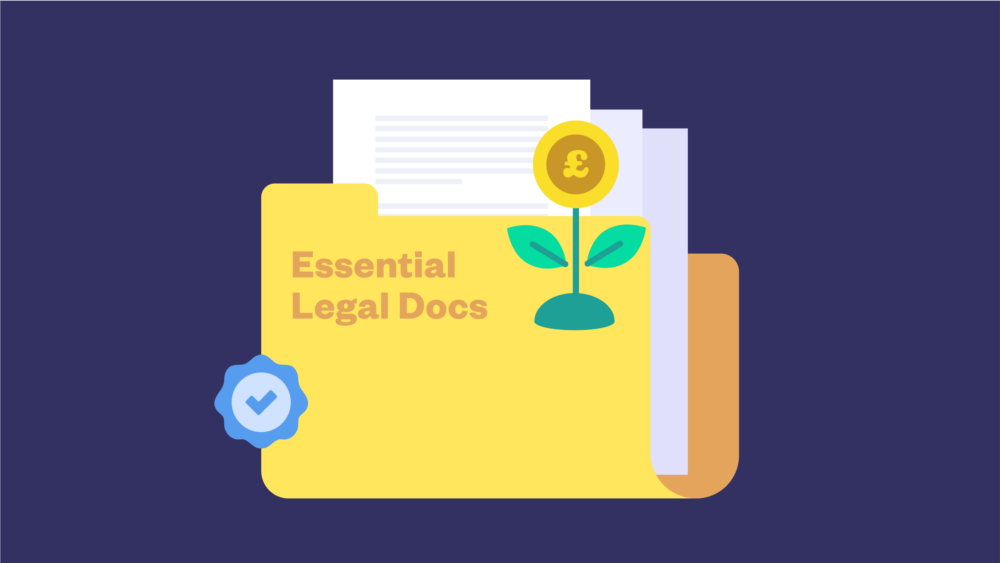NEW in SeedLegals for Investors: more functionality, visibility and efficiency
You now have more control to lead your deals and see what’s happening at each stage. See the latest updates in the SeedL...
Ready to back a UK startup? Exciting! But surprise, surprise – there’s paperwork involved. Luckily, we’re here to make it straightforward and understandable.
In this guide, we’ll walk you through the essential legal docs you need to invest in a UK startup. From Term Sheets to Shareholders Agreements, we’ll explain what each document is for and key information to know about them.
Five-minute video lessons delivered daily by email. Expertise from thousands of startup investments. Loads of bonus content.
Sign up nowThink of a Term Sheet as the map of your investment deal. It’s a non-binding document that sketches out the main terms and conditions of your investment. It gives you a snapshot of what’s being offered, like the company’s valuation, the amount you’re putting in, and what you get in return (typically, a slice of equity pie). Key terms to pay attention to include:
The Term Sheet often includes any extra perks or rights investors like you might enjoy, such as voting rights or anti-dilution protection. It’s like a mini road map before you dive into the serious documents.
Jonny SeamanIt’s crucial to understand your Term Sheet. This is something we help investors and founders with a lot at SeedLegals, and is included in our Investors services. So please do get in touch if you have any questions about a Term Sheet.
Investor Partnerships Manager,
While not a document, per se, due diligence is a process that every savvy investor should undertake. It involves thoroughly reviewing the startup’s financials, team, market opportunity, IP, and legal status. Basically, you’re confirming that what the startup claims to be is, in fact, reality.
You can invest ahead of a round too, via an Advanced Subscription Agreement. At SeedLegals, we call it a SeedFAST. This allows you to put your money in earlier and take on a bit more risk but you’ll be rewarded with a discount on the round. So you might get more shares for the amount you invest.
Investor Partnerships Manager,
A SeedFAST, also known as an Advance Subscription Agreement (ASA) is an increasingly popular way to invest in UK startups. With a SeedFAST, you commit funds now, but rather than receiving shares right away, your investment converts into shares during the next funding round. It’s a flexible approach that lets the startup get the cash it needs early on while deferring the issuance of shares until a pre-determined “trigger event,” like a major funding round.
Here’s why investors like SeedFASTs:
SeedFASTs are an excellent choice if you want to invest in a startup without immediately getting bogged down in valuations. They’re essentially a “you’re in, let’s grow together” approach to investing.
Convertible Notes ( called a SeedNOTE at SeedLegals) are a unique type of investment that starts as a loan and is either repaid, or converted into equity later. You lend money to the startup, and instead of being repaid , the note can convert into shares when the startup raises its next funding round. SeedNOTEs can be advantageous in fast-growing startups or when both the company and investors want flexibility. However, they’re not SEIS/EIS-friendly.
Here’s why investors like convertible notes:
The SHA lays out the rights and responsibilities between the founders and shareholders.
Some key clauses to watch out for:
This document dictates how the company is governed, what powers the board has, and how shareholders can exercise their rights.
Key points to look out for include:
Jonny SeamanWhile the Term Sheet might be two or three pages of high-level bullet points, the Shareholders’ Agreement and Articles tend to contain the full legalese to run through all the key terms in legal writing. You want to make sure everything matches up and what you agreed has been put in place.
Investor Partnerships Manager,
Advance Assurance is approval from HMRC that a company meets the requirements for investors to receive SEIS/EIS tax relief on their investment.
The SEIS (Seed Enterprise Investment Scheme) and EIS (Enterprise Investment Scheme) are designed to make investing in early-stage UK startups that much sweeter. These schemes offer significant tax relief for investors—up to 50% for SEIS and 30% for EIS.
If you want to benefit from SEIS/EIS tax relief, ask the founders for their Advance Assurance approval from HMRC.
After you’ve invested in an SEIS/EIS compliant company, ask the founders for your SEIS3/EIS3 certificate so you can claim tax relief.
Once your investment is complete, the startup will issue a share certificate—a document as evidence that, yes, you officially own shares in the company. Think of it as your membership card in the startup’s exclusive club. The share certificate includes key details like:
Share Certificates are more than a keepsake—they’re a record of your ownership. And if you ever sell your shares, you’ll need to hand it over to the new owner as part of the transaction.
Technically not a legal document, the cap table (short for “capitalisation table”) shows you who owns what and how much after your investment. It’s basically an equity ledger, detailing who’s in, who’s out, and what everyone’s stake looks like. If your investment company uses SeedLegals, they can grant you access to view their cap table right on the platform.
A quick cap table peek lets you check:
Want to learn how to invest in startups? Or gain new tips and tricks on angel investing? We’ve got the course for you.
Learn step-by-step how top angels make investments:
✅5 short video lessons straight to your inbox
✅Expertise from thousands of startup investments
✅Loads of bonus content
✅Insights from industry experts
It’s free and only takes 10 minutes a day for one week.
Sign up now and we’ll send you the first email right away.
We make it easier and simpler to invest in startups. Learn more about how we help investors, and book a free call with one of our experts who can talk you through it.









